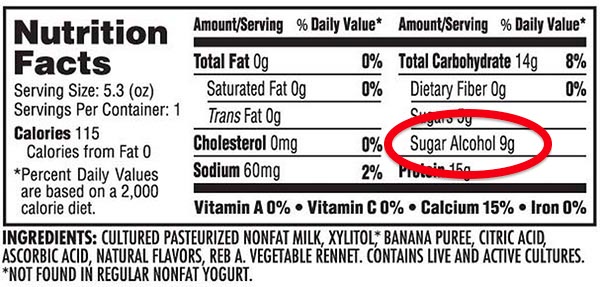Sugar vs. Sugar Alcohols
If you eat protein bars, or low sugar foods, you’ve probably seen sugar alcohol listed among the ingredients in many popular brands.
What Exactly Is Sugar Alcohol?
Sugar alcohols, also known as polyols, are a type of reduced-calorie sweetener. These sweeteners are commonly found in soda, ice creams, cookies, puddings, candies and chewing gum, foods labeled as “sugar-free” or “no sugar added.” Sugar alcohols are a carbohydrate. They, however, provide fewer calories than sugar and have less of an effect on blood glucose (blood sugar) than other carbs. Sugar alcohols are also commonly found in products considered ‘healthy’.
Most sugar alcohols are less sweet than sucrose; maltitol and xylitol are about as sweet as sucrose. Sugar alcohols occur naturally in a wide variety of fruits and vegetables, but are commercially produced from other carbohydrates such as sucrose, glucose, and starch.
Sugar alcohol is a popular sugar replacement often found in foods such as protein bars because they contain few calories. Sugar alcohols minimally impact insulin levels, are safe for those with diabetes. Sugar alcohols are less damaging to teeth due to their antibacterial properties. These properties reduce the risk of cavities from natural sugar and makes them a popular ingredient for chewing gum.
Sugar has 4 calories per gram
Sugar Alcohols have 2-3 calories per gram
Sugar alcohol is a molecular structure, which is a hybrid between a sugar molecule and an alcohol molecule, containing neither sugar or alcohol. Biochemically, sugar alcohols are structurally similar to sugar but are either poorly digested (e.g., maltitol), or poorly metabolized (e.g., erythritol).
Here are some popular sugar alcohols. Look for these listed on a product’s nutrition label:
Maltitol, Erythritol, Isomalt, Lactitol, Sorbitol, Mannitol,Hydrogenated Starch Hydrolysates, and Xylitol
Those names are quite a mouthful! The question is, is it okay to put them in your mouth?
The short answer is yes, in moderation. Here’s why:
According to the U.S. Food and Drug Administration (FDA), sugar alcohols are “generally recognized as safe” (GRAS). (1) The available scientific evidence shows they are safe for use in foods and drinks. However, you should consume them in moderation. Because sugar alcohols aren’t completely absorbed by your body, eating large amounts can lead to bloating and diarrhea.
How much is too much?
The Academy of Nutrition & Dietetics advises that greater than 50g/day of sorbitol or greater than 20g/day of mannitol “may cause diarrhea.” (2)
While sugar alcohol might be better for you than actual sugar, it isn’t exactly healthy. If you’re craving something sweet, sugar alcohols are the lesser evil versus sugar. However, in terms of healthy-eating, I always recommend one would be much better off grabbing a piece of fruit than choosing a something full of this stuff.
For additional information, I recommend the following reports:
- http://www.fda.gov/food/ingredientspackaginglabeling/foodadditivesingredients/ucm397716.htm
- http://www.eatrightpro.org/resource/practice/position-and-practice-papers/position-papers/use-of-nutritive-and-nonnutritive-sweeteners



